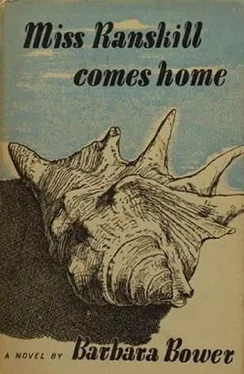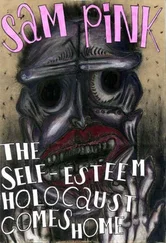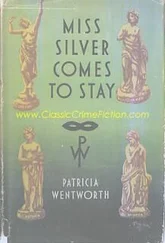Of course it wasn’t Mrs Phillips. Who was Mrs Phillips?
‘Mrs Phillips, I just wanted to make sure–’
‘This isn’t Mrs Phillips.’
‘Oh! is it you, Miss Ranskill?’
‘Yes, yes.’
‘I wonder if you’d be so very kind as to tell Mrs Phillips that the meeting is at half-past two on Thursday, not at three-thirty. And we do so hope that you’ll be able to come too.’
‘I don’t think–’ began Miss Ranskill.
‘Oh! what a pity! But I know it is your glove-making day. Well, if you will tell Mrs Phillips – thank you so much.’
One couldn’t go on holding a telephone receiver and listening to the low buzzing that hinted at maddening secrecy. Miss Ranskill hung the thing up and looked round another ugly room, made friendly this time by familiar things. The mantelpiece was crowded with objects that had the facile power to bring back a spring morning or a winter afternoon so clearly that she could almost smell the lilac through an open window, and then flick away a season to inhale the scent of chestnuts roasting on a hob. There was the weathercock man and the weathercock woman, who had been prodded with hatpins on the mornings before picnics. There was the mosaic box from Capri, holding as many secrets as Pandora’s casket – all the blue of the grotto and all the shimmering colours of the day. Her own photograph and her own Bible stood on Edith’s bedside table; in fact, the room held more of herself than her sister.
‘I had a lot of things then,’ thought Miss Ranskill, remembering the powder-bowl that the Carpenter had made, and the little besom for her hair. ‘I’d better find my room now and see if that’s crowded as well.’
The room opposite contained nothing that was recognisable. The bed was turned down for the night and a dressing-gown hung on the rail at its foot. She supposed it was one of her sister’s and felt grateful for the preparations, as she remembered how she had longed for the sight of a turned-down bed in the days when the wind had laid a shifting coverlet of sand in the island shelter. Here, too, was a bedside table with another Bible and another photograph on it. From its morocco leather frame the face of an elderly and rather offended-looking Army officer stared at Miss Ranskill. It couldn’t be a joke, Edith’s sense of humour was as orderly as her account book. Anyway, there was nothing at all jocular in that forbidding countenance.
She opened the Bible and read on the fly-leaf the inscription – ‘Philippa Gilroy with love from her Godmother, January 2nd, 1900.’ That told nothing.
And now Miss Ranskill was as baffled as any of the three little bears. ‘Who’s been sleeping in my bed?’ The absurd question drifted into her brain, and she glared at the huffy face in the photograph, before opening the door again.
There was a bathroom behind the third door on the little landing, and the fourth opened into a spare room, looking spare and mean and unwelcoming as such rooms sometimes do, when one guest has left and the next is not expected yet. The bed was humpy with folded blankets, the towel-rail was bare, and there was nothing on the dressing-table except a very unbecoming mirror that reflected Miss Ranskill’s baffled expression most unhappily.
‘Miaou! Miaou!’ The cat had left its squirming family and was coming up the stairs in search of her.
Miss Ranskill took it down to the kitchen, helped it to a saucerful of milk and returned to the drawing-room. She might as well, so she decided, get used to the room before Edith returned home. It must be her home, the boy from the station had led her to it at once, and there was the added evidence of possessions; but who was Mrs Phillips, and who was Philippa Gilroy, and who was the Army officer? Above all, where was Edith?
Nothing in the room could answer those questions, but the arrangement of the mantelpiece gave Miss Ranskill other things to think about.
A clock in a black marble case divided the broad shelf into two separate divisions: each of these was so crowded that it was not surprising that no one object had attracted her notice when she first came into the room.
On one side was a photograph that was twin to the one on the bedside table. Around it were snapshots, some blurred and some hideously distinct of the same man. Miss Ranskill now saw him in shorts, in plus-fours and in ordinary well-filled clothes. One silver cup made it clear that he had been a good golfer, another that he had succeeded in a gymkhana; and a rose-bowl bore witness to the fact that Major Phillips had been held in high esteem by the officers of his regiment and thought worthy of a wedding-present. There were some medals, more Indian knick-knacks and a little silver elephant.
But if one side of the mantelpiece was a shrine, the other was rival to it, and Miss Nona Ranskill herself was the heroine. She nearly trod a kitten to death as she read a framed obituary notice from The Times and learned that ‘the beloved younger sister of Edith Ranskill’ was believed to have been drowned at sea on the date when she had actually been washed ashore on the island.
A bunch of fresh flowers stood before a photograph that had flattered Miss Ranskill on her twenty-ninth birthday. There was another quite large and all too clear photograph of a stained glass memorial window. The figure in the window stood beside a magnolia tree that rose rather surprisingly from a patch of water thick with fish. Their faces gaped up hungrily and with disapproval. A magnifying-glass, which lay beside the frame, helped her to decipher the legend below the fishes. This time, it was final, though it contained a hint that sooner or later the sea was expected to give up its dead and that Nona Ranskill would be included.
A feeling of importance trickled into Miss Ranskill’s mind, but it was followed by a sense of guilt. It was tactless of her to have remained alive after so much trouble had been taken. Edith, who hated any detail of a plan to be changed, must be annoyed, particularly if she had paid for the window out of her own money and not from the legacy. For Edith had a way of budgeting funds and allowed no overlapping – only sacrificial changes.
‘That’s my new summer dress,’ she used to say, pointing to an asparagus bed, or (showing visitors the kitchen range) ‘That’s my trip to Bruges.’
Miss Ranskill wondered if the stained glass window was the price of her sister’s new teeth, chintz covers for the drawing-room or charity subscriptions for the year. She did not want to be an object of charity, though that might be easier to bear than a new-born relationship with a toothless and martyred Edith.
‘Very upsetting,’ she murmured, and felt like a ghost.
Then she wondered absurdly if she could be sharing the hearth-rug with the real plus-foured ghost of Major Phillips, if he too were looking at his photograph just as she was looking at hers.
‘We don’t give the dead a chance,’ she thought. ‘As soon as they are dead we endue them with attributes they would have loathed.’ For a moment she became as wise as the dead and aware that dissolution of the body could not mean destruction of humour and judgment and the sense of fitness.
Her hands stretched out for the hated and flattering photograph, but, before they could reach it, the latch of the little gate clicked and she turned to look out of the window.
A woman in a black and white dress was walking up the path. Before her lumbered a very fat liver-and-white spaniel.
Miss Ranskill reached the front doorstep just as the tail-end of her sister’s skirt whisked round the side of the house. The spaniel, who had stopped to snuffle at a bone, heard the ring of the scraper on the stone flags and cocked up her ears.
Читать дальше












